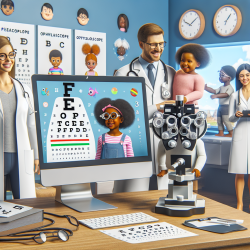As practitioners dedicated to enhancing the development and well-being of children, it is imperative to stay informed about evidence-based practices that can improve outcomes. A recent study titled Recommendation for ophthalmic care in German preschool health examination and its adherence: Results of the prospective cohort study ikidS provides valuable insights into the importance of ophthalmic care in preschool health examinations and the factors influencing adherence to these recommendations.
The study, conducted in the Mainz-Bingen region of Germany, examined the frequency and adherence to ophthalmic care recommendations given during preschool health examinations. The results showed that 84% of children who received a recommendation visited an ophthalmologist within the preceding year, compared to 47% of children who did not receive such a recommendation. This significant difference underscores the importance of making and following through on these recommendations.
Key Findings
- Of the 1226 children included in the study, 109 received a recommendation for further ophthalmic care.
- Adherence to the recommendation was high, with 84% of recommended children visiting an ophthalmologist.
- Children with a migrant background and those from low socio-economic status families were less likely to adhere to the recommendations.
- Adherence was associated with a higher number of ophthalmologic visits, indicating effective follow-through on recommendations.
Implications for Practitioners
These findings have several important implications for practitioners:
- Emphasize the Importance of Vision Screening: Vision problems can significantly impact a child's ability to learn and succeed in school. Regular vision screenings should be a priority in preschool health examinations.
- Address Barriers to Adherence: Understanding the socio-economic and cultural barriers that may prevent families from following through on recommendations is crucial. Providing additional support and resources to these families can improve adherence rates.
- Collaborate with Other Professionals: Working closely with pediatricians, ophthalmologists, and other healthcare providers can ensure that children receive the comprehensive care they need.
Encouraging Further Research
While the study provides valuable insights, it also highlights the need for further research in this area. Future studies could explore:
- The long-term impact of early vision screenings on academic performance and overall development.
- Effective strategies for improving adherence to ophthalmic care recommendations, particularly in underserved populations.
- The role of technology, such as telehealth services, in increasing access to vision care for children.
By staying informed and proactive, practitioners can play a critical role in ensuring that all children have the opportunity to reach their full potential. To read the original research paper, please follow this link: Recommendation for ophthalmic care in German preschool health examination and its adherence: Results of the prospective cohort study ikidS.










